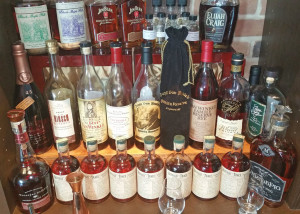By Richard Thomas
Plenty is wrong with the secondary market. Provenance is unheard of, so fakes are rampant, and despite this prices are often inflated. Yet above those problems is the plain fact that selling liquor without a license is illegal. Since you can’t reform a black market, so long as that was the case none of the other problems could be addressed.
Some of that changed this month, at least insofar as the Commonwealth of Kentucky was concerned, as HB100 went into effect. Signed into law by Governor Matt Bevin last March, the new law loosens up the sale of “vintage spirits.” One of the problems with the sale of rare bottles is that the regulations regarding who can resell them is even more byzantine than laws governing who can sell new, retail alcohol. Kentucky now allows for those who already have a retail liquor license—bars, restaurants and stores—to purchase and resell these “dusties.” Until now, if you wanted to sell vintage spirits in Kentucky, your sole option was to go through a properly licensed auctioneer.
The Commonwealth’s place as home of the Kentucky Bourbon Trail and center of American Whiskey tourism makes it an ideal place for setting up a trade in vintage bottles. People already come to the state looking for them, and the legalization of the vintage bottle trade will encourage people to bring their dusties to Kentucky for sale as well. The only other place in America that I could imagine becoming as natural a destination to sell or shop for old bottles of whiskey is the very booze industry-centric New York City.
Furthermore, the presence of the Bourbon industry and so many Bourbon experts in the state gives it advantages in terms of verification. If a liquor store wants to verify if a bottle of pre-Prohibition Old Time Brand Kentucky Bourbon is genuine, who better to have take a look than, say, Michael Veach? Or perhaps someone from Old Pogue, where they have some bottles in storage? It’s easy to see where a modest business in verification could spring up if the trade in vintage bottles takes off.
Another, much overlooked change also made by HB100 is a provision allowing distilleries to sell their own wares at “fairs, festivals and similar events.” Previously a special license was necessary, which proved a major hurdle for craft distillers in particular, forcing them to rely upon middlemen and cutting into their profits. Now small distillers can attend these events and sell directly to the public.
 The Whiskey Reviewer A World of Whiskey, Poured Every Weekday
The Whiskey Reviewer A World of Whiskey, Poured Every Weekday

